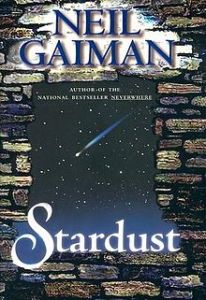Stardust by Neil Gaiman
‘I will bring you that fallen star’
Stardust is a book written by Neil Gaiman and it is about a man called Tristran Thorn who vows to retrieve a fallen star for his beloved, a woman called Victoria Forester.
I was familiar with some of Neil Gaiman’s work previously, but I had not read any of it. Considering my fascination with fantasy and magical realism novels, I will continue to explore his work in the near future. I am aware that there is a film adaptation of Stardust but I have not seen it, although I might watch it at some point and see if it lives up to my expectations that I concluded from the novel. As I read the book, I realize how the Take That song made for the film suits the moral of the story. I was recommended this book by my older sister, and as I was reluctant to explore more in the fantasy genre, I had a go at reading it.
This book is short and sweet and I finished it in about two days. Although the concept of having someone retrieve a fallen star for the person that they love is considered to be a cliched idea, Neil Gaiman does it in such a way that makes you fall in love with his vivid descriptions and characters that is all too common in the fantasy genre. His characters, however, are distinguishable. I do love a good fairytale. I also have a small interest in stars and it is simply fascinating looking at them on a cold winter’s night. Stardust is also quite an easy book to follow and everything starts to come together the more that you read it. I tended to avoid the reviews of the book to keep my first impression of the novel fresh and undiluted from someone else’s negativity.
This book strives on conflict. On one side, there is Tristran wanting to catch a falling star as a favour for the woman that he loves, and on the other side, there is the evil witch who wishes to destroy the star. What was particularly effective was the fact that the star was personinified as an actual woman, a lady called Yvaine. Gaiman takes what would usually be cliches if applied to any other story and puts his own individual twist on it, making you dwell in a fantastic fantasy world that you refuse to leave. His narrative does not go down a straight road full of predictabilities. The book is full of surprises. Tristran does not even marry the woman who he retrieved the star for. This suggests that even if you go the distance for people, they would not care in return, as it shows in the book when Victoria Forester marries someone else.
I would definetly read this book more than once. The characters are not just cardboard characters, I personally think that they are metaphors. Tristran’s journey represents maturity into adulthood, and the personification of the star represents goodness and hope while the witch represents evil. Witches are common creatures in folklore, giving more of a reason to make her villainous. She also has a motive to be evil, to destroy people’s happiness, so she isn’t just a cartoon villian. Gaiman’s vivid descriptions of the woods and trees and the sky and the the stars can easily make you fall in love with the book so that you are seduced by his effective narrative.
Overall, a fantastic book that I shall reread at some point, full of surprises and wonderful characters. As it is set in the Victorian Era, the author gives a bit of context at the beginning of the book and dwells off into his own fantasy world that readers can easily get lost in. The book also makes me really want either a goat drawn carriage or a unicorn. The fact that the author uses goats and unicorns etc instead of horses gives its own individuality, only a subject to the writer’s eccentricities. Apparently Stardust is a sequel to a book that Neil Gaiman never published but Stardust is fine on its own.
4.5/5
